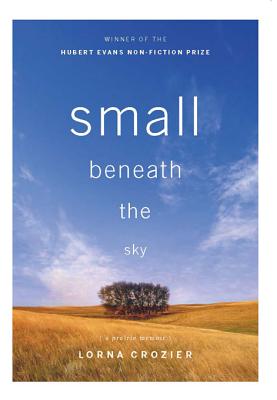Small Beneath the Sky is a tender, unsparing portrait of a family. It is also a book about place. Growing up in a small prairie city, where the local heroes were hockey players and curlers, Lorna Crozier never once dreamed of becoming a writer. Nonetheless, the grace, wisdom, and wit of her poetry have won her international acclaim. In this marvellous volume of recollections, she charts the geography that has shaped her character and her sense of home.
Crozier vividly depicts her hometown of Swift Current, with its one main street, its two high schools-the one on top of the hill was for the wealthy kids - and its three beer parlours, where her father spent most of his evenings. She captures crystal moments from her childhood - delivering newspapers with her brother in the blue-snow light of a winter morning, planting potatoes under a pale full moon, enjoying an illicit night swim in the town's public pool. She writes unflinchingly, too, about the grief and shame caused by poverty and alcoholism. At the heart of the book is Crozier's fierce love for her mother, Peggy, her no-nonsense champion and moral guide.
The people in these pages are drawn simply, without adornment, as befits the landscape in which they live. Interspersed with the narratives of daily life - sometimes funny, sometimes heartbreaking - are prose poems evoking the elements. These "first causes" - dust, light, rain, wind, snow-take on mythical qualities in Crozier's sure hands, imparting ancient knowledge about the prairie grasslands and their effect on those who have put down stakes there.
Rich in detail, generous in spirit, this unconventional memoir pays tribute to life's mysteries, secrets, and surprises. Lorna Crozier approaches the past with a tactile, arms-wide-open sense of discovery. Calling on the ghosts of ancestors and the power of memory, she has traced her beginnings with a poet's precision and an open heart.
Crozier vividly depicts her hometown of Swift Current, with its one main street, its two high schools-the one on top of the hill was for the wealthy kids - and its three beer parlours, where her father spent most of his evenings. She captures crystal moments from her childhood - delivering newspapers with her brother in the blue-snow light of a winter morning, planting potatoes under a pale full moon, enjoying an illicit night swim in the town's public pool. She writes unflinchingly, too, about the grief and shame caused by poverty and alcoholism. At the heart of the book is Crozier's fierce love for her mother, Peggy, her no-nonsense champion and moral guide.
The people in these pages are drawn simply, without adornment, as befits the landscape in which they live. Interspersed with the narratives of daily life - sometimes funny, sometimes heartbreaking - are prose poems evoking the elements. These "first causes" - dust, light, rain, wind, snow-take on mythical qualities in Crozier's sure hands, imparting ancient knowledge about the prairie grasslands and their effect on those who have put down stakes there.
Rich in detail, generous in spirit, this unconventional memoir pays tribute to life's mysteries, secrets, and surprises. Lorna Crozier approaches the past with a tactile, arms-wide-open sense of discovery. Calling on the ghosts of ancestors and the power of memory, she has traced her beginnings with a poet's precision and an open heart.










